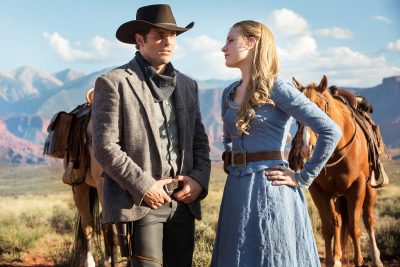
HBO stands for Home Box Office, implying that you do not have to go to the theater to achieve a quality cinematic experience. The premium cable channel has proven time and time again that it can deliver on quality. Flagship shows like “The Sopranos,” “The Wire,” “Game of Thrones” and more have made HBO a household name. But with “Game of Thrones” coming to an end after season eight, HBO needs a new show to spearhead through the golden age of television. That is where “Westworld” comes in.
Based on the 1973 Michael Crichton film of the same name, “Westworld” is a futuristic theme park where visitors relive the Wild West and have free reign to do as they please. The artificial world is populated by equally artificial people: androids.
These androids are major plot additives, providing mystery, thematic relevance and horror. They are undoubtedly the driving force of the show, and the audience will always be questioning who is real and who is not. This persistent mystery gives the show an air of tension and intrigue.
While the show deals with a number of mysteries and plotlines weaving in and out of one another, it never feels excessive. The show manages these intersections well by using scene transitions to naturally look into other parts of Westworld. The viewer will get big-picture information from a scene outside the park, and then in the next scene sees how that information impacts the story in Westworld itself. This well-thought-out story structure makes getting into the show easier to understand.
The overarching thematic question drives the plot: where is the line between man and machine? The park managers seem apathetic to the idea and only view the androids as attractions in the park. However, the architect behind all of these androids, Dr. Robert Ford (Anthony Hopkins), cares for and sympathizes with his creations. Ford is reminiscent of Dr. Hammond from “Jurassic Park,” another Michael Crichton story. The show has already hinted that Ford’s attachment to his creation will blind him to their potential dangers, much like Dr. Hammond.
These dangers become increasingly real as the androids begin to diverge from their scripted programming. They not only become a danger to real people like park goers and the park managers, but to themselves as well. As they become increasingly intelligent and self-aware, the thin veil of their reality begins to fall apart. Their subsequent reaction, violent or not, will be the show’s driving force for the rest of the season.
All of the above is presented beautifully through Jonathan Nolan’s superb direction and stylistic choices. The contrast between the frontier and the dystopian future — or perhaps utopian, to a fault — creates a wide variety of striking scenery. One of which is an enticing visual motif that, once subverted, ends the premiere on a frightening note.
The show’s aesthetics also serve to elevate the already excellent writing and acting. Character attitudes and motivations are made very clear from the get-go, by showing, not telling, the viewer through a series of scenes that are naturally woven together. The audience quickly learns each individual’s true character as the ever-increasing challenges of Westworld push them further and further.
While some may have seen HBO faltering — with the cancellation of shows like “Vinyl” and the numerous delays of “Westworld’s” premiere — the channel has proven once again that it is the gold standard. “Westworld” undoubtedly has the quality to appeal to a broader audience; now it is up to the viewers whether or not they will go on this wild ride.
















































































































